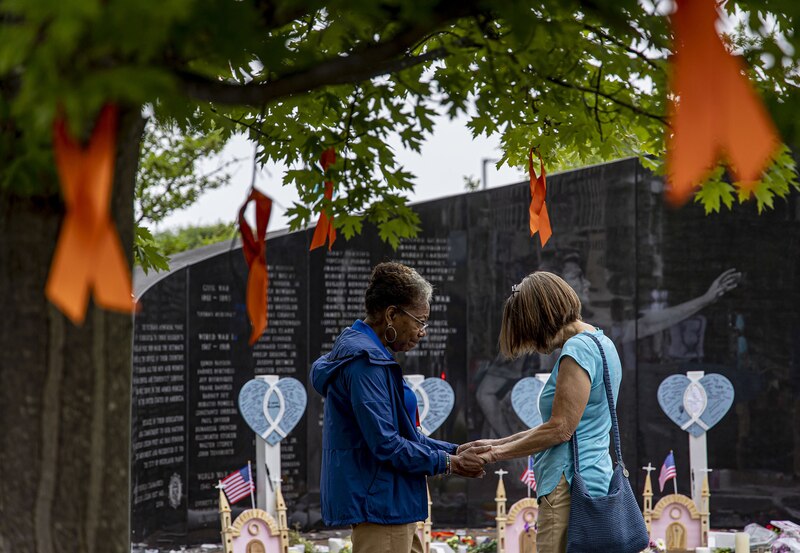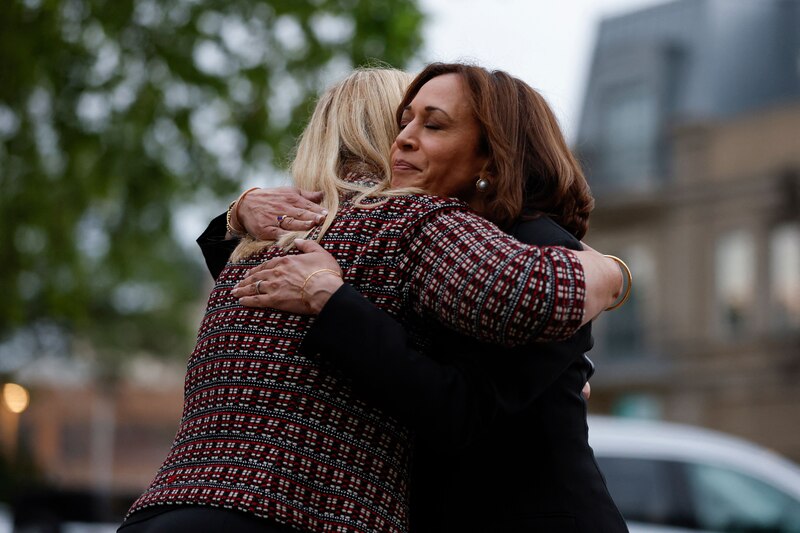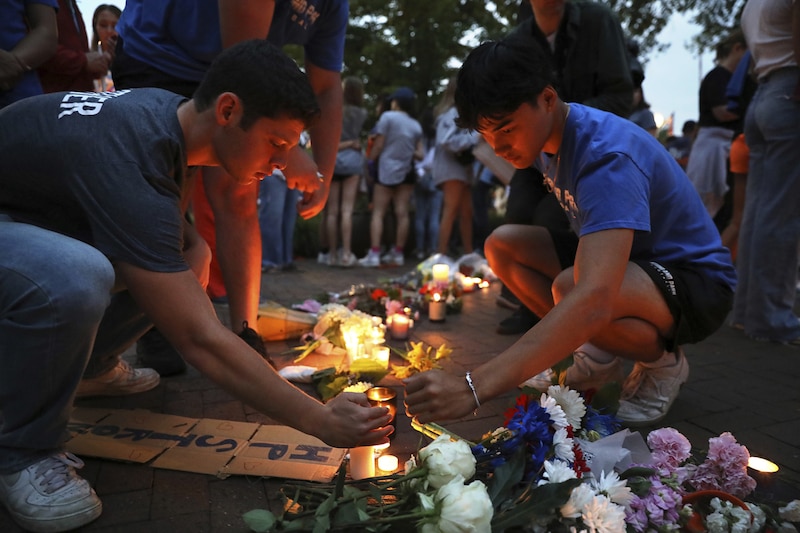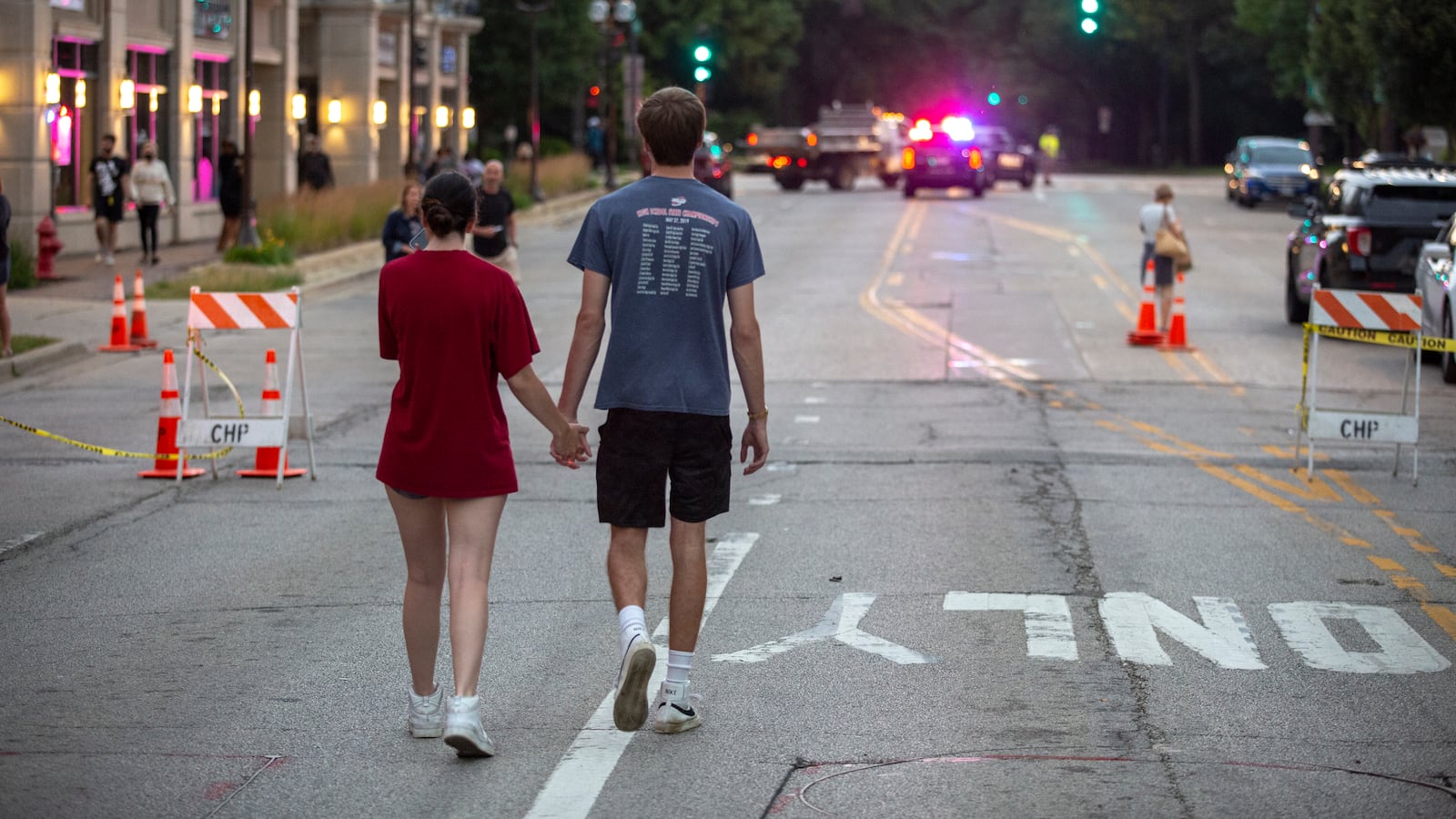Stephanie Diaz was at a debate camp, three hours away from her hometown of Highland Park, Illinois, when she got a text from her boyfriend:
“You might be seeing something on the news in a bit, but we’re safe. I’ll get more details later, but everyone is safe.”
“Wait, what’s happening,” she responded.
“There might’ve been a shooting in Downtown, at the parade we were just at.”
The rising junior at Highland Park High School turned to social media, confirming that a gunman had opened fire on a crowd of Fourth of July paradegoers. She immediately checked on her family members — including her mother who works at a Potbelly less than half a block away from the parade route.
Her mom had been escorted from the sandwich shop to her car. Safe. Her brother was away that weekend. Safe. Her dad, a truck driver, wasn’t there. Safe.
Still, the 16-year-old couldn’t sit still 200 miles away.
“The only thing I wanted to do was be back home, be with my family and see them,” Diaz said. “The most terrifying thought was I could have lost them in a split moment.”
The following morning, she was at her high school volunteering as school officials helped provide crisis support to a grieving community wrestling with the trauma that rippled through the suburb nestled 27 miles north of downtown Chicago.
In the wake of the Independence Day shooting that claimed the lives of seven and wounded more than 30 people, District 113 and District 112 transformed their schools into a haven for students, staff, families, and other Highland Park residents, offering mental health services and support for yet another community hit by gun violence.
The response in Highland Park is an example of how schools across the country have often been thrust into the frontlines, helping students and the broader community cope with the aftermath of mass shootings and increasing gun violence.

The Highland Park shooting came less than two months after a gunman killed 19 students and two teachers at Robb Elementary School in Uvalde, Texas, and a supermarket shooting in Buffalo, New York, which killed 10 and left three wounded, just 10 days before that. In all, more than 300 mass shootings have taken place in the U.S. so far in 2022, according to the Washington Post.
Beyond high-profile mass shootings, gun violence has been on the rise in recent years. And students in major cities have been forced to navigate neighborhood gun violence that seeps into schools with few resources to address ongoing trauma.
In Chicago, union leaders, parents, and students have long called for more mental health services to handle the ripple effects of gun violence on the South and West Sides.
Since spring 2021, Chicago Public Schools has been working to expand a network of care teams to address trauma including gun violence. But parents, teachers, and students say more is still needed.
In Highland Park, District 113 and District 112 officials responded quickly to the shooting. Within hours, they announced plans to offer trauma services at Highland Park High School and Deerfield High School, said Karen Warner, District 113’s communications director.
Over the course of the next two days, district staff and more than 30 counselors from the surrounding area served about 600 people, Warner said in an email.
“We know this incident will have a profound impact on the community for a long time,” Warner said.
Among the victims was 8-year-old Cooper Roberts, who remained in critical condition days after he was shot in the chest and his spinal cord was severed. His twin brother and mother Keely Roberts, superintendent of Zion Elementary School District 6, were also injured in the shooting.
Chicago Public Schools teacher Zoe Kolpack, her husband, her father, and her brother-in-law attended the parade and were among the dozens wounded. CPS officials were in contact with Kolpack, and their crisis team and support service were available to support Kolpack’s colleagues and students at William Dever Elementary staff, according to a statement posted on Twitter.
“Chicago Public Schools is devastated to learn that one of our CPS teachers and her family members are among those who were injured in Monday’s mass shooting in Highland Park,” the district said in the July 5 statement.
Chicago Public Schools frequently dispatches mental health and crisis services to individual schools that have been affected by gun violence, but staff and families have advocated for more sustained support.
Last month, teacher Jessie Hudson stood outside Jacob Beidler Elementary School on Chicago’s West Side and called on the district to bolster schools with more counselors and social workers to help students deal with the impact of neighborhood gun violence. Hudson, along with union leaders, teachers, parents, and students, were holding a vigil to remember students lost to gun violence over the past year.
“Our children need the counselors in the school more often,” Hudson said. “Our children need psychologists in the school more often. I’m not a psychologist — I’m a teacher so I try to stay in my lane. But I want to give them as much as I can of me so that they can have someone to talk to.”
In Highland Park, residents are still trying to make sense of the mass shooting that catapulted their suburb into the national spotlight.
North Shore School District 112, which serves Highland Park and neighboring Highwood elementary school students, moved their counselors from Highland Park High School and opened two of its schools last week to provide counseling services for younger children.
As part of the community fabric, school leaders needed to “rise up” with “care, love, and compassion” to serve the community, said Michael Lubelfeld, District 112 superintendent.
The emergency response was to handle “an immediate, outpouring of grief, fear, confusion, anger, and a need for some support,” Lubelfeld said.
In recent years, Lubelfield said, the district has been increasing the number of therapists, counselors, and social workers to deal with social emotional issues stemming from the fallout of the pandemic. The shooting in Uvalde only intensified that urgency for more support, he added.
While the Highland Park shooting didn’t take place at a school, “it did shatter the innocence of our community — and has a residual effect on our schools,” Lubelfield said. “The schools are the frontline for the community’s children.”
“We’re the frontlines for everything that goes on in society — good or bad,” he added. “And right now, every school needs to have therapists on site.”
The FBI’s Victims Service Response Team also set up a family assistance center at Highland Park High School to offer additional trauma counseling, government aid assistance, and financial assistance, said Chris Covelli, deputy chief of the Lake County Sheriff’s Office.
Illinois Gov. JB Pritzker also issued a disaster proclamation for Lake County, effectively expediting the use of state resources, personnel, or equipment to aid in the Highland Park recovery.
“There are no words for the kind of evil that turns a community celebration into a tragedy,” Pritzker said in a press statement. “As we mourn together, the State of Illinois will provide every available resource to Highland Park and surrounding communities in the days and weeks ahead as the community works to recover from this horrific tragedy.”

Vice President Kamala Harris visited the scene of the massacre the day after the shooting and offered her condolences to the Highland Park community, saying the nation needed to take this seriously.
“I’m so sorry for what you experienced,” Harris said. “This should never have happened.”
The Biden administration, Harris said, would continue to provide “all of its resources” for the mayor, the police chief, and others.
In the aftermath of the trauma, “a lot of healing,” physically and emotionally, would have to happen, Harris said.
“There’s no question that this experience is going to linger in terms of the trauma,” Harris said, while urging all families and individuals to seek support “you so rightly deserve.”
The day after the shooting, families trickled out the front doors of Highland Park High School, some embracing one another, others wiping tears from their eyes, or rubbing the upper back of a loved one to offer comfort. Small children walked out with large plush stuffed animals or small plastic bags filled with various items.
A man, woman, and two young children settled on a patch of grass nearby, eating tacos from a food truck giving out free food to community members making their way in and out of the high school.
The man in the group turned down a request for an interview, saying in Spanish: “I’ve been talking all day and I just want to be at peace with what happened.”
Standing outside the school, Rabbi Anne Persin said three of her congregants were wounded and two remained hospitalized. Still in shock, Persin said she was trying her best to provide spiritual guidance to her congregations.
“I don’t want thoughts and prayers. I want actions,” Persin said, adding that if the shooter obtained the guns legally, “then the laws are wrong.”
Inside the school, grief counselors and social workers provided mental health service and support to staff, students, and families, according to a Highland Park High School teacher. Chalkbeat is not naming the teacher because they did not have approval from the district to speak with the press.
Therapy dogs were also brought in to support community members stopping by for services.
The teacher said a lot of students, parents, and family members of those injured showed up last week for crisis counseling. Staff also came in to be with each other.
“Everyone processes it differently,” the teacher said, “which is what I think we are trying to work together to figure out.”

The teacher stressed that they wanted to make sure students had an open door to process the events – whether through one-on-one therapy or play-based therapy for younger children.
Gisele Ramilo, whose husband works for District 113, said district officials have done an excellent job in responding to the shooting.
“That’s a good start,” said Ramilo, a teacher at Oak Park and River Forest High School.
“I believe at the beginning of the school year there should be some sort of professional development for teachers, students, and the community to have an outlet to talk about what they’re thinking and feeling,” she said. “I think people are scared and nervous now.”
Stephanie Diaz, the Highland Park student who rushed back from camp, also appreciates the resources flowing into the community.
“It’s amazing so many volunteered to come help,” she said. “Personally, I’ve never seen anything like this. I’ve never seen our community do something like this.”
Mauricio Peña is a reporter for Chalkbeat Chicago, covering K-12 schools. Contact Mauricio at mpena@chalkbeat.org.

